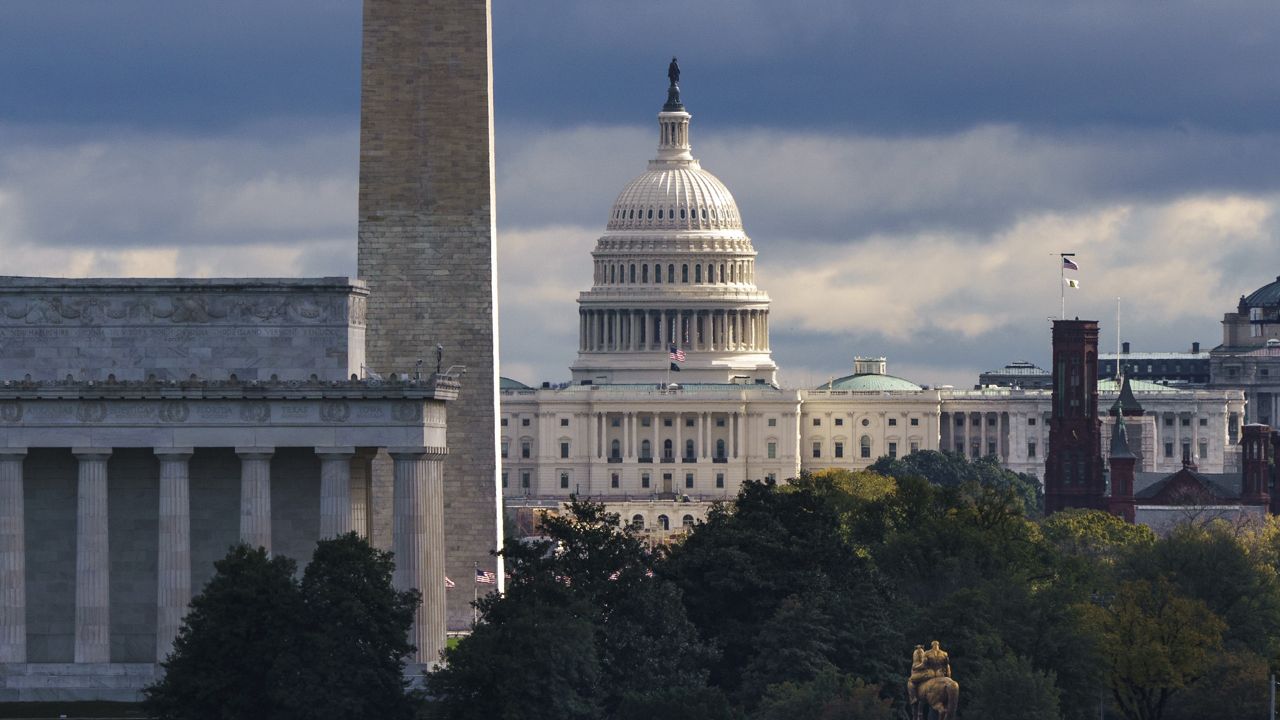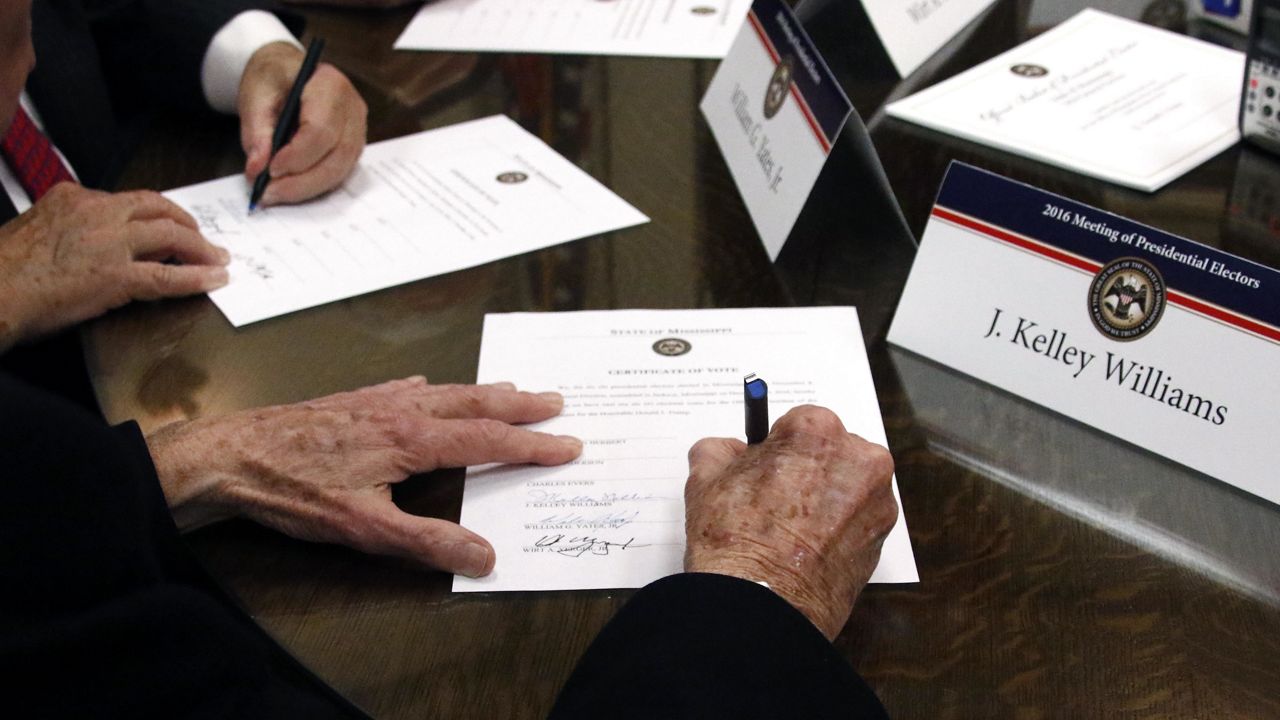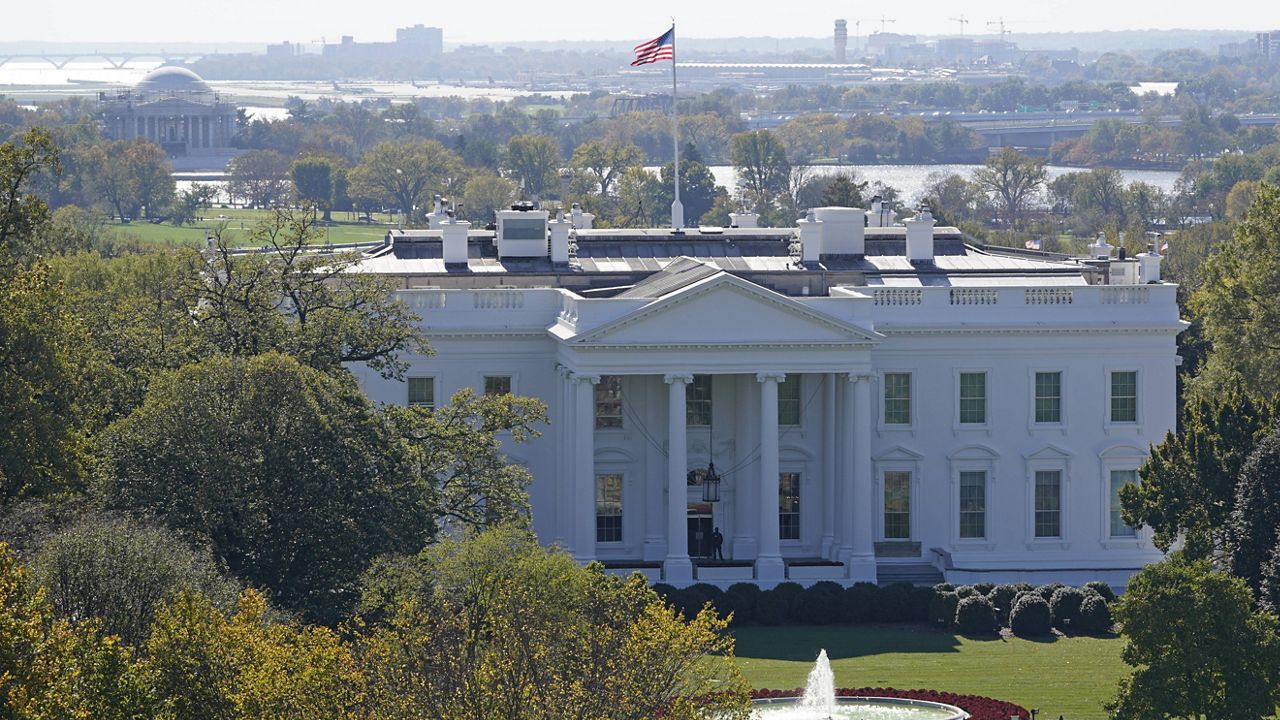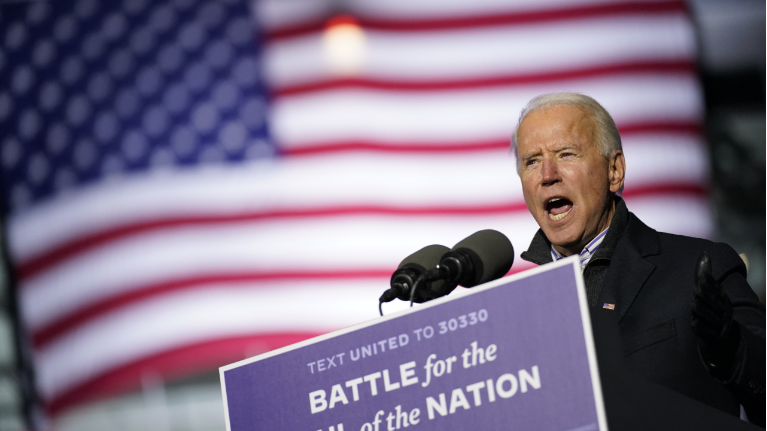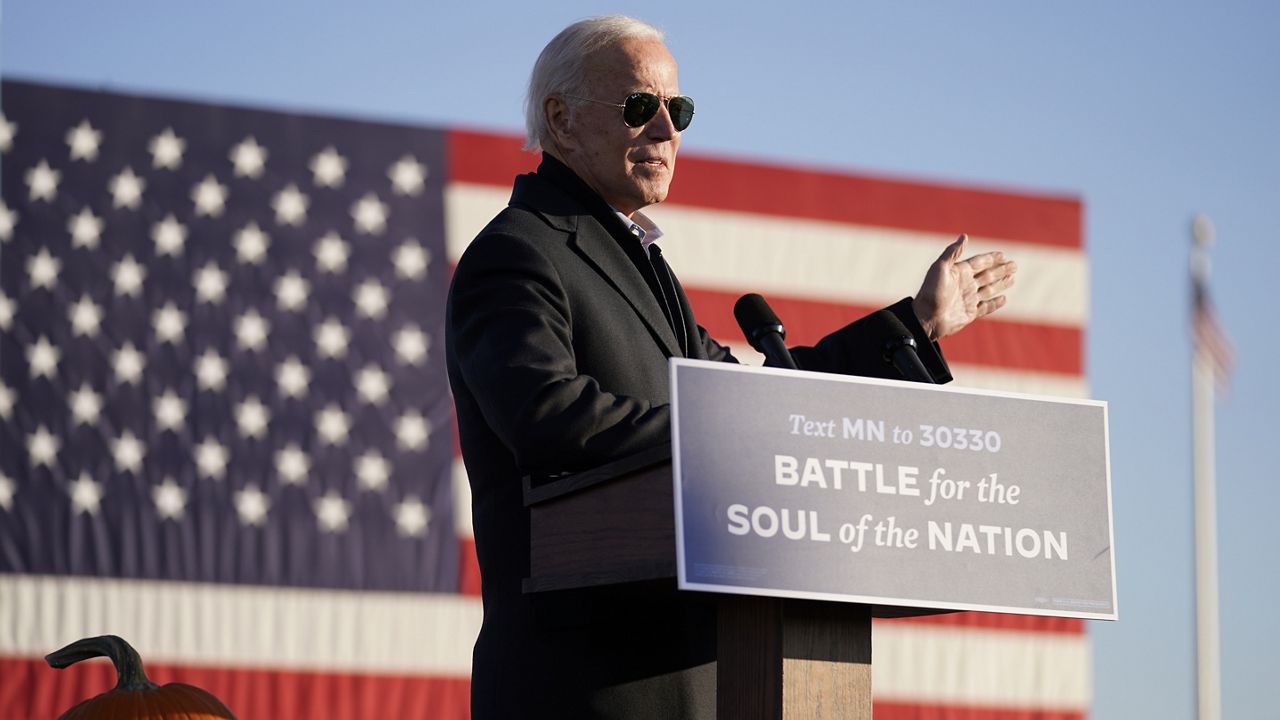After a handful of high-profile Senate races that shattered records for spending, with ambitions of flipping the chamber for the first time in 6 years, Democrats appear to have seriously underperformed expectations, though a few races are still outstanding.
Though Democrats appear to have won a key Senate seat in Arizona, a state that the AP projects former Vice President Joe Biden flipped from President Trump, Republicans appear to have cruised to a win in Alabama.
Republicans and Democrats are currently deadlocked at 47 seats each – 45 are held by Democrats, with two Independents who caucus with Democrats.
What did Democrats enter Election Day with? 47 seats – 45 held by Democrats, two Independents who caucus with Democrats.
Here's where things stand in in 11 key Senate races.
Democrat Jon Ossoff trails incumbent Sen. David Perdue by about 188,000 votes, but the race could still head for a runoff as votes are still counted in the Peach State.
In Georgia, candidates need to reach a 50% threshold to win outright; if not, the race heads to a runoff in January.
The race is still too close to call.
Republican incumbent Sen. Kelly Loeffler will face Democrat Raphael Warnock, a Black pastor at the church where the Rev. Martin Luther King Jr. preached, in the Jan. 5 runoff special election for the seat Loeffler was tapped to fill for retired Sen. Johnny Isakson.
Sen. Loeffler was being investigated by the Justice Department for stock sales made shortly before the coronavirus pandemic tanked global markets, along with three other Senators: Sen. James Inhofe (R-OK), Sen. Richard Burr (R-NC), and Sen. Dianne Feinstein (D-CA).
All senators involved denied any wrongdoing, and the Justice Department later closed the inquiry into Loeffler, along with Feinstein and Inhofe.
Loeffler, a prominent businessperson who owns the WNBA’s Atlanta Dream, sent a letter to the league urging them to put an American flag on player jerseys rather than the planned social justice messages of "Black Lives Matter" and "Say Her Name.” In response, players on her own team (in addition to other teams) wore shirts that supported one of her opponents, Rev. Raphael Warnock.
Warnock, the senior pastor of Ebenezer Baptist Church in Atlanta, where Dr. Martin Luther King was a pastor, led all candidates with over 31% of the vote, followed by Loeffler with 26.5% of the vote. No other Democrat in the race came close to Warnock's lead.
Democrat Mark Kelly won the Arizona Senate seat once held by John McCain, riding Arizona’s changing electorate to flip a Republican Senate seat in a state long dominated by the GOP.
Arizona will send two Democrats to the Senate for the first time in nearly 70 years when Kelly joins Kyrsten Sinema in Washington.
Kelly, a former astronaut, defeated Republican Martha McSally, who was appointed to the seat by GOP Gov. Doug Ducey after McCain’s death in 2018.
In his first run for political office, Kelly positioned himself as a pragmatic centrist with no patience for Washington partisanship. When the coronavirus pandemic struck, he retreated to mostly online outreach, minimizing face-to-face campaigning while blasting McSally and President Donald Trump for allowing the pandemic to get out of control.
“The work starts now. And we desperately need Washington to work for Arizona,” Kelly told a small group of family and reporters gathered for his victory speech in Tucson. “My top priority is making sure we have a plan to slow the spread of this virus, and then getting Arizona the resources our state needs right now.”
Kelly flew four space shuttle missions and leaned heavily on his NASA background in campaign ads and speeches, but he’s perhaps best known in Arizona as the husband of former Democratic U.S. Rep. Gabrielle Giffords, who was shot in the head in an assassination attempt during a constituent event in Tucson in 2011.
An influx of new voters in the fast-growing suburbs of Phoenix and extensive get-out-the-vote effort in the Latino communities in Phoenix and Tucson helped put Arizona, a longtime Republican stronghold, in play for Democrats. The trend accelerated with a shift away from the GOP among white suburban women who turned against Trump.
The 2018 victory of Sinema, the first Democrat to win an Arizona Senate seat in 30 years, illustrated the changing nature of the state.
Kelly had a big fundraising advantage, outraising McSally by more than $30 million through Oct. 14. Both candidates shattered fundraising records for Arizona, raising more than $146 million between them, more than triple the combined spending on the 2018 McSally-Sinema race. Independent groups spent tens of millions more to sway voters.
Kelly will take office as early as Nov. 30, finish the last two years of McCain’s term and then face reelection in 2022.
Republican Lindsey Graham of South Carolina has secured a fourth term in the U.S. Senate, defeating Democratic challenger Jaime Harrison in a race that mustered astounding fundraising, captured national attention and represented the toughest reelection fight of Graham’s 25-year congressional career.
“This victory is an answer to a lot of prayers,” Graham told supporters Tuesday night in Columbia. “To those of you who have been following this race from afar, I hope you got the message. If you don’t get this message, it’s hopeless.”
The competition between Graham and Harrison turned into South Carolina’s most expensive race ever, with both candidates posting record fundraising that has surpassed $200 million total and continued to grow in the race’s closing days. Harrison raised $57 million in the third quarter alone, shattering all quarterly Senate fundraising records. He became the first U.S. Senate candidate to ever amass a war chest of more than $100 million over the course of the race.
Graham told The Associated Press late last week he had also raised at least $100 million, his third-quarter haul of $28 million being the largest ever posted by a Republican Senate candidate in a quarterly filing period.
Graham often critiqued Harrison for relying mostly on out-of-state supporters, who made up about 90% of his donor base. Early on, through relationships forged in part through his standing as associate Democratic National Committee chairman, Harrison attained a high profile that brought with it small-dollar donors from all over the country, many funneled through Democrats’ ActBlue fundraising portal.
In his pursuit of a fourth term, Graham also went outside the state for money, with about 86% of his funders living somewhere other than South Carolina. Both candidates, along with third-party groups pouring money into the race, waged nonstop ad campaigns on television and digital spaces that at times left voters fatigued by the content inundating them at every turn.
To Harrison’s funders, Graham spoke directly Tuesday.
“You wasted a lot of money,” he said. “This is the worst return on investment in the history of American politics.”
With 91% of the expected vote in, Graham led Harrison by nearly 15 percentage points, a margin that was close to his 2014 victory over a state senator, who had raised about $500,000 total.
So, who won the most expensive Senate race in U.S. history?
We don't know yet.
With 94% of the state reporting, incumbent Sen. Thom Tillis (R-NC) leads Democratic challenger Cal Cunningham by less than 100,000 votes.
Cunningham, a state senator in the Tar Heel State, acknowledged exchanging sexually suggestive texts with a woman who’s not his wife. The Associated Press later reported Cunningham and the woman had an intimate encounter as recently as July.
Tillis, who narrowly defeated the late Democratic Sen. Kay Hagan in 2014, is struggling to make up ground in North Carolina, a state which holds a negative approval rating of President Trump, as well as a positive approval rate of Biden and the state’s Democratic Gov. Roy Cooper (who the AP projected to win re-election Tuesday), according to a recent NBC / Wall Street Journal poll.
North Carolina is a key state for Trump’s reelection chances – as well as a crucial Senate seat for both parties.
Neither the race, nor the state, have been called as of Wednesday morning.
Former college football coach Tommy Tuberville on Tuesday recaptured a U.S. Senate seat for Republicans by defeating Sen. Doug Jones of Alabama, who had widely been considered the Senate’s most endangered Democrat.
Republicans had made taking back the once reliably conservative seat a priority in 2020. Tuberville, who has never held public office and last coached four years ago, aligned himself closely with President Donald Trump and declared in the campaign: “God sent us Donald Trump.”
“Alabama, welcome back to the Republican U.S. Senate,” Tuberville shouted after taking the stage to loud cheers at his election night party in downtown Montgomery. Tuberville captured 62% of the vote with 89% of ballots counted.
“I want to thank Doug Jones for his hard work and effort, but it’s time to go home, Tuberville said as the crowd cheered. “Sometimes you end up on the wrong side of the scoreboard.”
State Republicans and Tuberville had hammered at Jones over a handful of votes, including his decision to convict Trump during the impeachment trial. Tuberville promised the crowd that he would “be guided by shared values, conservative values and I will always vote with the majority of people in the state of Alabama.”
Tuberville took a congratulatory call from Vice President Mike Pence on stage after his victory was declared. “Let me say to everyone across the state of Alabama thank you for delivering a great victory for President Donald Trump and thank you for delivering a great new senator to Washington D.C,” Pence said on speaker phone to the crowd.
Tuberville, referencing Jones’ better funded campaign, said out-of-state donors “learned the hard way that Alabama’s Senate seat can not be bought.”
“If you allow me to quote one of my opponent’s many campaign ads, they can all go to hell and get a job,” he said. Jones ran an ad showing Tuberville using the phrase to respond to student hecklers after leaving a coaching job.
Three years ago, Jones became the first Alabama Democrat elected to the U.S. Senate in a quarter-century. His victory was aided by scandal after Republican Roy Moore, already a controversial figure in the state, faced allegations of sexual misconduct from decades earlier.
Republican Joni Ernst won reelection to her Iowa U.S. Senate seat Tuesday after an expensive and at times bruising race against Democrat Theresa Greenfield.
Voters gave another term to Ernst following a campaign that featured a blizzard of television ads and three heated televised debates. The two candidates had more than $170 million in spending on media as parties and interest groups poured money into the race, one of the costliest in the nation.
“The election is over and it’s time to start the healing,” Ernst said after taking the stage at a downtown Des Moines hotel to chants of “Joni.”
“There is far more than unites us than divides us," she said.
It was a more intense race than in 2014, when Ernst breezed into office with an 8-point victory thanks in part to an image molded by television ads of her riding a motorcycle, shooting a handgun and promising to make big-spenders in Washington “squeal.” The squeal ad in particular vaulted Ernst to national attention, as she walked through a barn while noting she “grew up castrating hogs on an Iowa farm” and was ready to cut pork. The ad was interspersed with scenes of pigs and the sounds of squeals.
In her campaign for reelection, Ernst portrayed herself as deeply conservative but willing to work with Democrats when possible.
Thinking back to her earlier Senate campaign, Ernst said, “Tonight it feels even better.”
Greenfield choked back tears as she conceded the race at another hotel just blocks from Ernst.
“The job we have to do now is come together as a country and a state,” Greenfield said.
While Greenfield won in the state's larger cities, Ernst carried more rural areas of the state.
Republican Steve Daines was reelected Tuesday to Montana's U.S. Senate seat that he wrested from Democrats six years ago after overcoming his opponent's huge cash advantage to keep the post in GOP hands.
Daines, a former business executive and President Donald Trump loyalist, defeated Montana's Democratic governor, Steve Bullock.
His 2014 victory broke a Democratic lock on the Senate seat that had lasted more than 100 years. His reelection Tuesday further solidifies Republican political dominance in the state and came on a night that saw his former boss and longtime friend, Greg Gianforte, elected Montana governor.
“I’m very humbled and pleased to see such strong support tonight all across Montana,” Daines told The Associated Press. “This once again shows the great common sense that Montanans have. They are not going to be swayed by a bunch of out-of-state money flooding into the state.”
Bullock is a two-term Montana governor who entered the race in March after dropping a presidential bid that attracted little support.
He congratulated Daines in a concession statement issued by his campaign.
“I ran for office twelve years ago with one goal in mind: to make a meaningful difference in people’s lives," Bullock said. “Montana has been a gift to me, and given me more than I could ever give back. I have been so grateful to have served as Montana’s Governor and Attorney General.”
Political groups and the campaigns poured more than $100 million into the contest.
Democrat Sara Gideon called Republican Sen. Susan Collins to concede the Maine Senate race, the incumbent told supporters Wednesday.
“I just received a very gracious call from Sara Gideon conceding the race,” Collins said, to cheers from her supporters gathered in Bangor, Maine. “I want to publicly thank Sara for her call, we had a good talk and I very much appreciated her taking the time to call.”
“Let me say what an extraordinary honor it is to represent the great state of Maine, and to know that I will have the opportunity to serve all of Maine for the next 6 years.”
Another state Democrats hoped to flip has been held by the Republican incumbent, making their road to a majority in the Senate harder.
"While we came up short, I do believe Mainers in every corner of this state are ready to continue to work together to make a difference," Gideon said in her concession speech on Wednesday afternoon.
"Just now, I spoke with Senator Collins. I told her that I will always be available to serve the people of Maine," Gideon continued. "Ultimately, that's why I entered this race and it's why I got involved in public service in the first place."
"While this election may be over, we have to work together to build a better future," Gideon added. "One where everyone has access to health care they can afford, where we tackle the climate crisis head on, and where we restore our economy by prioritizing hard working people and their families."
"So let's get some rest, let's reflect on the work that we've done over the past 16 months, and then let's get back to work," she concluded.
Democrat John Hickenlooper has defeated Republican Sen. Cory Gardner in one of the closest-watched Senate races in the nation.
Gardner was widely seen as one of the most vulnerable Republicans because Colorado had shifted strongly to the left since his election to the Senate in 2014. Hickenlooper is a popular former two-term governor who relentlessly tied Gardner to President Donald Trump during the race.
“Clearly people are saying it’s time to turn the page,” Hickenlooper said in a Facebook address after his victory. “It’s time to start solving problems and that’s what I intend to do.”
Hickenlooper cited the coronavirus pandemic, health care, climate change and racial justice as some of his priorities in Washington. He also thanked Gardner for his service.
“Lord knows the system in Washington is a broken mess,” Hickenlooper said. “Tonight, I pledge to work my heart out for the state I love.”
Gardner, surrounded by family, cited a list of his accomplishments during his term — including promoting the move of the Bureau of Land Management to Colorado as well as fossil fuels and renewable energy investment — and pledged to help Hickenlooper prepare for the Senate.
“He knows I will support him in this transition in any way I can,” Gardner said in a Facebook address after he called Hickenlooper to congratulate him. “Please understand, to all the people who supported our efforts tonight, that his success is Colorado’s success, and our nation and our state need him to succeed.”
Rep. Ken Buck (R-CO), chair of the Colorado Republican Party, issued a statement saying, “I want to thank Senator Cory Gardner for his decades of service to our state. Cory has consistently fought for opportunities to make life better for Coloradans by building a pathway for greater prosperity and opportunity for all.”
Gardner struggled to distinguish himself from the president. He touted a sweeping public lands bill he coauthored, a national suicide prevention hotline he launched and various federal goodies he secured for Colorado. But none were enough to escape from Trump’s shadow.
Democrats have won every statewide race since Gardner’s election, with the exception of a board of regents position in 2016.
The election caps a four-year push by Democrats in Colorado, a state that was once known for its status as an evenly divided partisan battleground but has become reliably Democratic under Trump.
Gardner has been something of the last of his kind, a relic of a barely red-leaning state in which rural and urban areas had equal sway.
In the presidential battleground of Michigan, Republicans made an aggressive push for John James, a Black Republican businessman who stood by Trump at a rally late Monday, against incumbent Democratic Sen. Gary Peters.
The contest may shape which party controls the Senate, where the GOP now has the majority.
“It’s pretty clear we’re not going to know the results until sometime tomorrow,” Peters said at an event in Pontiac on Tuesday night. “A number of jurisdictions are still processing this massive amount of absentee ballots. ... Stay tuned.”
Addressing supporters gathered at his business in Detroit, James said: “There’s still a lot of votes to be counted to be sure. But we’re extremely excited and optimistic about where we stand right now.”
Peters has been touting his bipartisan accomplishments during his first term while arguing that Republicans lack a health care plan if the Supreme Court strikes down the Affordable Care Act and that a Democratic-led Senate would be key to Biden’s success as president. He also has noted that James has publicly supported Trump.
James is a West Point graduate and Iraq war veteran. He has called Peters an “invisible man” who skips committee meetings while attacking his liberal viewpoints. James has vowed to protect people with preexisting conditions, fight for lower drug prices and strengthen manufacturing.
More than $100 million has been spent in the race. Michigan has not elected a Republican to the Senate since 1994.
The Associated Press contributed to this report.
